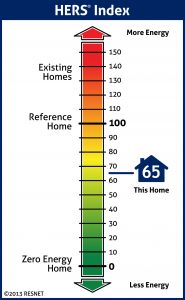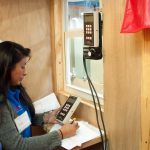 What is a Home Energy Rating?
What is a Home Energy Rating?

 The Home Energy Rating System (HERS) provides a standardized evaluation of a home’s energy efficiency and expected energy costs. HERS Ratings provide a relative energy performance measure called the HERS Index. A HERS Index of 100 represents the energy use of the “HERS Reference Home.” An Index of 0 (zero) indicates that the proposed building uses no net purchased energy (a Net Zero Energy Building).
The Home Energy Rating System (HERS) provides a standardized evaluation of a home’s energy efficiency and expected energy costs. HERS Ratings provide a relative energy performance measure called the HERS Index. A HERS Index of 100 represents the energy use of the “HERS Reference Home.” An Index of 0 (zero) indicates that the proposed building uses no net purchased energy (a Net Zero Energy Building).
An energy rating can qualify a homeowner or home buyer for high-performance home designations like EPA ENERGY STAR® or DOE Zero Energy Ready Home programs. It can also maximize the value of the largest single investment most homeowners are likely to make in their entire lifetime.
Learn More: RESNET Website: Home Energy Rating
Thinking About Buying a Home?
 If you’re thinking about buying a home, consider getting an energy rating. Before you sign a contract, learn more about home energy ratings. Like a miles-per-gallon sticker for your car, energy ratings give new and existing home buyers a marketplace yardstick that measures the benefits of energy efficiency.
If you’re thinking about buying a home, consider getting an energy rating. Before you sign a contract, learn more about home energy ratings. Like a miles-per-gallon sticker for your car, energy ratings give new and existing home buyers a marketplace yardstick that measures the benefits of energy efficiency.
Download the “Thinking About Buying a Home” brochure that explains the benefits.
When Should I Hire a Home Energy Rater?
A certified Home Energy Rater can help you get to the most cost-effective, high-performance home. Energy Raters perform home energy ratings on new and existing homes.
-
New Home Construction
A certified Home Energy Rater can make a significant difference in the energy performance of a new home. Energy raters understand the energy implications of home design, and therefore, they can steer consumers in the most cost-effective direction with respect to performance. Raters ensure that you get what you pay for through rigorous testing and inspection protocols. Remember, the building energy code represents the worst home you are allowed to build, not the most cost-effective. A certified Home Energy Rater can help you get to the most cost-effective high-performance home. It will be both less expensive to operate and more comfortable to live in.
-
Existing Homes
Existing homes often offer significant energy improvement opportunities. However, because energy efficiency is not often a visible home attribute, these opportunities often go unclaimed. Certified Home Energy Raters measure and analyze the efficiency of homes, such as air leakage and insulation effectiveness. In this way, a Home Energy Rating makes a home’s energy attributes visible. A certified Home Energy Rater can assist homeowners in taking advantage of the most cost-effective opportunities to make significant improvements to an existing home.
Learn More About Energy Efficiency
- How is energy efficiency determined?
- How can I improve my home’s energy efficiency?
- What software tools are available?
- How do Ratings relate to ENERGY STAR homes and other programs?
- How can I see if a house has been rated?
 Where Can I Find a Home Energy Rater or Blower Door Tester?
Where Can I Find a Home Energy Rater or Blower Door Tester?
- Florida FSEC-Certified HERS Residential Raters
- Florida FSEC-Certified Blower Door Testers
- National RESNET Professional Member.
How Can I Become a Rater?

FSEC offers hands-on instruction to become a certified Home Energy Rater in the state of Florida.
Learn More: FSEC’s EnergyGauge Rater Training Courses
For Raters
- ENERGYGAUGE USA is the tool for you.
- National Rating Standards posted on RESNET Website.
Florida Compliance Air and Duct Tightness Forms:
Effective July 1, 2017, every new home in Florida must be tested for building air tightness. FSEC has created a specialized tool called EnspectorPro to help enable this testing requirement.
EnspectorPro is a cloud-based building envelope leakage testing (blower door) reporting and verification tool. The University of Central Florida’s FSEC Energy Research Center developed EnspectorPro.
EnspectorPro helps improve the quality control of throughput of building envelope leakage field test results. It works on office computers, tablets and smart phones, making it easy to email test reports from the field to the main office, builder or building department.
Select your air and duct tightness forms now at EnspectorPro.com.
[Last Updated: 11/11/2019]
